Product Overview
† commercial product
Omega 3 Fish Oil Capsules are compounded dietary supplements containing concentrated marine-derived omega-3 fatty acids, primarily eicosapentaenoic acid (EPA) and docosahexaenoic acid (DHA).
These essential fatty acids are obtained from fish oil sources and may support cardiovascular health, cognitive function, and inflammatory response modulation.
Each capsule contains 1,000 mg of omega-3 fish oil concentrate.
The product is formulated to provide therapeutic levels of omega-3 fatty acids that may not be readily achievable through dietary sources alone.[1]
The typical dosage for Omega 3 Fish Oil Capsules is one 1,000 mg capsule daily, or as directed by a healthcare provider.
Dosing may be individualized based on patient-specific factors, therapeutic goals, and response to treatment.
Capsules should be taken with meals to minimize gastrointestinal side effects and enhance absorption.
For cardiovascular support, doses may range from 1-4 grams daily, while inflammatory conditions may require different dosing regimens.
Patients should swallow capsules whole with adequate water and should not chew or break the capsules.
Treatment duration and dosage adjustments should be determined by healthcare providers based on therapeutic response and patient tolerance.
Regular monitoring of lipid levels and other relevant parameters may be recommended during treatment.
Patients should not exceed recommended dosages without medical supervision.[7]
Omega-3 fatty acids, particularly EPA and DHA, exert their therapeutic effects through multiple biochemical pathways.
These polyunsaturated fatty acids may integrate into cellular membrane phospholipids, potentially altering membrane fluidity and influencing cellular signaling processes.
EPA and DHA could serve as precursors for specialized pro-resolving mediators, including resolvins and protectins, which may help modulate inflammatory responses and promote tissue healing.
The cardiovascular benefits may result from potential improvements in endothelial function, reduction in triglyceride synthesis, and favorable effects on blood pressure regulation.
Additionally, DHA is particularly concentrated in neural tissues and may support cognitive function through maintenance of neuronal membrane integrity and neurotransmitter synthesis.
The anti-inflammatory properties may involve inhibition of pro-inflammatory cytokine production and modulation of eicosanoid metabolism.[2]
Omega 3 Fish Oil Capsules may be contraindicated in patients with known hypersensitivity to fish, shellfish, or any components of the formulation.
Individuals with bleeding disorders or those taking anticoagulant medications should exercise caution, as omega-3 fatty acids may potentially enhance bleeding risk.
Patients with severe liver disease may require careful monitoring, as high doses of fish oil could potentially affect liver function.
Those with diabetes should be monitored closely, as omega-3 supplements may influence blood glucose levels.
Patients scheduled for surgical procedures may need to discontinue use prior to surgery due to potential bleeding complications.
Individuals with compromised immune systems should consult healthcare providers before use, as omega-3 fatty acids may modulate immune responses.[3]
Omega-3 fatty acids may potentially interact with anticoagulant and antiplatelet medications, including warfarin, heparin, clopidogrel, and aspirin, potentially increasing bleeding risk.
Concurrent use with blood pressure medications may result in additive hypotensive effects, requiring careful monitoring and possible dosage adjustments.
Interactions with diabetes medications could potentially affect blood glucose control, necessitating more frequent monitoring in diabetic patients.
Cyclosporine levels may be influenced by omega-3 supplementation, requiring therapeutic drug monitoring in transplant patients.
Concurrent use with other lipid-lowering agents may produce additive effects on triglyceride levels.
Omega-3 fatty acids may potentially enhance the effects of anti-inflammatory medications, which could be beneficial but may require monitoring for enhanced therapeutic or adverse effects.[4]
Common side effects associated with Omega 3 Fish Oil Capsules may include gastrointestinal disturbances such as nausea, diarrhea, indigestion, and abdominal discomfort.
Patients may experience a fishy aftertaste or burping, which can sometimes be minimized by taking capsules with meals or freezing them before consumption.
Some individuals may develop headaches, particularly during initial treatment phases.
Skin reactions, including rash or itching, may occur in sensitive individuals.
Higher doses may potentially cause loose stools or increased bleeding tendency.
Rarely, patients may experience mood changes or alterations in immune function.
Most side effects are dose-dependent and may resolve with dosage adjustment or discontinuation.
Patients should report any unusual or persistent adverse effects to their healthcare provider promptly.[5]
The use of Omega 3 Fish Oil Capsules during pregnancy requires careful consideration and medical supervision.
DHA is particularly important for fetal brain and eye development, and adequate maternal intake may support optimal fetal growth.
However, concerns about mercury contamination and other environmental toxins in fish oil products necessitate careful product selection and dosing.
Pregnant women should only use pharmaceutical-grade, tested fish oil preparations under healthcare provider guidance.
The potential benefits of omega-3 supplementation during pregnancy may include reduced risk of preterm birth and support for fetal neurodevelopment.
Breastfeeding mothers may also benefit from omega-3 supplementation to support infant brain development through breast milk.
However, dosage should be carefully monitored to avoid excessive intake, and any
supplementation should be part of a comprehensive prenatal care plan.[6]
Omega 3 Fish Oil Capsules should be stored in a cool, dry place away from direct sunlight and heat sources.
The optimal storage temperature is below 25°C (77°F) to prevent oxidation and maintain product stability.
Capsules should be kept in their original container with the lid tightly closed to protect from moisture and air exposure.
The product should be stored away from children and pets in a secure location.
Refrigeration may help extend shelf life and reduce fishy odor, but freezing should be avoided as it may damage capsule integrity.
Patients should check expiration dates regularly and discard expired products appropriately.
Signs of product degradation include unusual odor, discoloration, or capsule deformation.
Proper storage conditions are essential for maintaining the therapeutic potency and safety of the omega-3 fatty acids.[8]
- Swanson, D., Block, R., & Mousa, S. A. (2012). Omega-3 fatty acids EPA and DHA: Health benefits throughout life. Advances in Nutrition, 3(1), 1-7. https://doi.org/10.3945/an.111.000893
- Calder, P. C. (2017). Omega-3 fatty acids and inflammatory processes: From molecules to man. Biochemical Society Transactions, 45(5), 1105-1115. https://doi.org/10.1042/BST20160474
- Bernasconi, A. A., Wiest, M. M., Lavie, C. J., Milani, R. V., & Laukkanen, J. A. (2021). Effect of omega-3 dosage on cardiovascular outcomes: An updated meta-analysis and meta-regression of interventional trials. Mayo Clinic Proceedings, 96(2), 304-313. https://doi.org/10.1016/j.mayocp.2020.08.034
- Gencer, B., Djousse, L., Al-Ramady, O. T., Cook, N. R., Manson, J. E., & Albert, C. M. (2021). Effect of long-term marine ω-3 fatty acids supplementation on the risk of atrial fibrillation in randomized controlled trials of cardiovascular outcomes. Circulation, 144(25), 1981-1990. https://doi.org/10.1161/CIRCULATIONAHA.121.055654
- Bradberry, J. C., & Hilleman, D. E. (2013). Overview of omega-3 fatty acid therapies. P&T, 38(11), 681-691.
- Middleton, P., Gomersall, J. C., Gould, J. F., Shepherd, E., Olsen, S. F., & Makrides, M. (2018). Omega-3 fatty acid addition during pregnancy. Cochrane Database of Systematic Reviews, 11(11), CD003402. https://doi.org/10.1002/14651858.CD003402.pub3
- Maki, K. C., Palacios, O. M., Bell, M., & Toth, P. P. (2017). Use of supplemental long-chain omega-3 fatty acids and risk for cardiac death: An updated meta-analysis and review of research gaps. Journal of Clinical Lipidology, 11(5), 1152-1160. https://doi.org/10.1016/j.jacl.2017.07.010
- Shahidi, F., & Ambigaipalan, P. (2018). Omega-3 polyunsaturated fatty acids and their health benefits. Annual Review of Food Science and Technology, 9, 345-381. https://doi.org/10.1146/annurev-food-111317-095850
- Harris, W. S., & Von Schacky, C. (2004). The Omega-3 Index: A new risk factor for death from coronary heart disease? Preventive Medicine, 39(1), 212-220. https://doi.org/10.1016/j.ypmed.2004.02.030
- Mozaffarian, D., & Wu, J. H. (2018). Omega-3 fatty acids and cardiovascular disease: Effects on risk factors, molecular pathways, and clinical events. Journal of the American College of Cardiology, 58(20), 2047-2067. https://doi.org/10.1016/j.jacc.2011.06.063
- Kris-Etherton, P. M., Harris, W. S., & Appel, L. J. (2002). Fish consumption, fish oil, omega-3 fatty acids, and cardiovascular disease. Circulation, 106(21), 2747-2757. https://doi.org/10.1161/01.cir.0000038493.65177.94
- Galli, C., & Calder, P. C. (2009). Effects of fat and fatty acid intake on inflammatory and immune responses: A critical review. Annals of Nutrition and Metabolism, 55(1-3), 123-139. https://doi.org/10.1159/000228999
- Richardson, A. J., & Montgomery, P. (2005). The Oxford-Durham study: A randomized, controlled trial of dietary supplementation with fatty acids in children with developmental coordination disorder. Pediatrics, 115(5), 1360-1366. https://doi.org/10.1542/peds.2004-2164
- Von Schacky, C. (2014). Omega-3 fatty acids in cardiovascular disease: An uphill battle. Prostaglandins, Leukotrienes and Essential Fatty Acids, 92, 41-47. https://doi.org/10.1016/j.plefa.2014.05.004
- Grosso, G., Galvano, F., Marventano, S., Malaguarnera, M., Bucolo, C., Drago, F., & Caraci, F. (2014). Omega-3 fatty acids and depression: Scientific evidence and biological mechanisms. Oxidative Medicine and Cellular Longevity, 2014, 313570. https://doi.org/10.1155/2014/313570
- Dyerberg, J., Madsen, P., Møller, J. M., Aardestrup, I., & Schmidt, E. B. (2010). Bioavailability of marine n-3 fatty acid formulations. Prostaglandins, Leukotrienes and Essential Fatty Acids, 83(3), 137-141. https://doi.org/10.1016/j.plefa.2010.06.007
- Pali-Schöll, I., & Jensen-Jarolim, E. (2011). Anti-acid medication as a risk factor for food allergy. Allergy, 66(4), 469-477. https://doi.org/10.1111/j.1398-9995.2010.02511.x
- Mason, R. P., & Sherratt, S. C. (2017). Omega-3 fatty acid fish oil dietary supplements contain saturated fats and oxidized lipids that may interfere with their intended biological benefits. Biochemical and Biophysical Research Communications, 483(1), 425-429. https://doi.org/10.1016/j.bbrc.2016.12.127
How long does it take to see benefits from Omega 3 Fish Oil Capsules?
The timeframe for experiencing benefits from omega-3 supplementation may vary significantly depending on the individual patient and therapeutic goals.
Some patients may notice improvements in certain parameters within 2-4 weeks, while more substantial benefits, particularly for cardiovascular health, may require 2-3 months of consistent use.
Anti-inflammatory effects may become apparent within 4-6 weeks, though some individuals may experience benefits sooner.
Cognitive benefits, if they occur, typically require longer treatment periods of 3-6 months or more.
It is important to maintain consistent daily supplementation and follow healthcare provider recommendations for optimal results.
Patients should not expect immediate dramatic changes and should discuss realistic expectations with their healthcare providers.
Regular monitoring and patient communication are essential for assessing therapeutic response and making necessary adjustments.[9]
Can Omega 3 Fish Oil Capsules be taken with other supplements?
Omega-3 fish oil capsules may generally be taken with most other dietary supplements, but certain combinations require careful consideration and professional guidance.
Vitamin E supplementation may be beneficial when taken with omega-3s, as it can help prevent oxidation of the fatty acids.
However, combining with other blood-thinning supplements like garlic, ginkgo, or high-dose vitamin E may increase bleeding risk.
Calcium and magnesium supplements are typically compatible with omega-3s and may even provide synergistic benefits for cardiovascular health.
Patients taking multiple supplements should maintain a comprehensive list and review it regularly with their healthcare provider.
Some fat-soluble vitamins may compete for absorption, so timing of administration may need to be considered.
It is always advisable to consult with a healthcare provider or pharmacist before adding new supplements to an existing regimen to avoid potential interactions or duplications.[10]
Are there any dietary restrictions while taking Omega 3 Fish Oil Capsules?
There are generally no specific dietary restrictions required while taking Omega 3 Fish Oil Capsules, though certain dietary considerations may enhance effectiveness and minimize side effects.
Taking the capsules with meals, particularly those containing some fat, may improve absorption and reduce gastrointestinal upset.
Patients should maintain a balanced diet rich in fruits and vegetables to provide antioxidants that may help protect the omega-3 fatty acids from oxidation.
Excessive alcohol consumption should be avoided, as it may interfere with fatty acid metabolism and increase inflammation.
Patients with fish allergies should exercise caution and may need to avoid fish oil supplements entirely.
Those following vegetarian or vegan diets may need to consider alternative omega-3 sources or discuss supplementation strategies with their healthcare provider.
Maintaining consistent timing of supplement intake with meals may help establish a routine and improve compliance.[11]
What should I do if I miss a dose of Omega 3 Fish Oil Capsules?
If a dose of Omega 3 Fish Oil Capsules is missed, patients should take the missed dose as soon as they remember, provided it is not close to the time for the next scheduled dose.
If it is nearly time for the next dose, patients should skip the missed dose and resume the regular dosing schedule.
Double doses should never be taken to make up for a missed dose, as this may increase the risk of side effects without providing additional benefits.
For patients who frequently miss doses, setting reminders or taking the supplement at the same time each day with a meal may help improve adherence.
Occasional missed doses are unlikely to significantly impact therapeutic outcomes, but consistent daily intake is important for maintaining steady omega-3 levels.
Patients experiencing difficulty with adherence should discuss strategies with their healthcare provider, who may suggest alternative formulations or dosing schedules.[12]
Can children take Omega 3 Fish Oil Capsules?
The use of Omega 3 Fish Oil Capsules in children requires careful evaluation by a pediatric healthcare provider, as dosing and safety considerations differ from adult populations.
Children may benefit from omega-3 supplementation for various conditions, including attention disorders, inflammatory conditions, or developmental support.
However, the 1,000 mg capsule strength may be too high for many pediatric patients, and alternative formulations or dosing strategies may be necessary.
Age-appropriate dosing typically ranges from 250-500 mg daily for younger children, with adjustments based on age, weight, and therapeutic indication.
Some children may have difficulty swallowing large capsules, necessitating liquid formulations or smaller capsule sizes.
Parents should never administer adult-strength supplements to children without professional guidance.
Pediatric omega-3 supplementation should always be part of a comprehensive healthcare plan and monitored by qualified professionals.[13]
Are there any specific laboratory tests I should have while taking Omega 3 Fish Oil Capsules?
While routine laboratory monitoring is not always necessary for patients taking Omega 3 Fish Oil Capsules, certain tests may be beneficial depending on individual circumstances and therapeutic goals.
Lipid panels, including triglyceride levels, may be monitored periodically to assess therapeutic response, particularly in patients using omega-3s for cardiovascular benefits.
Bleeding time or coagulation studies may be considered for patients at increased bleeding risk or those taking anticoagulant medications.
Liver function tests might be warranted in patients taking high doses or those with pre-existing liver conditions.
Blood glucose monitoring may be important for diabetic patients, as omega-3s may influence glucose metabolism.
Some healthcare providers may recommend omega-3 index testing to assess tissue levels of EPA and DHA.
The frequency and type of monitoring should be individualized based on patient risk factors, concurrent medications, and therapeutic objectives.[14]
How do I know if the Omega 3 Fish Oil Capsules are working?
Determining the effectiveness of Omega 3 Fish Oil Capsules may involve both subjective improvements and objective measurements, depending on the intended therapeutic goals.
Patients using omega-3s for cardiovascular health may see improvements in lipid profiles, particularly triglyceride levels, within 4-8 weeks of consistent use.
Those taking supplements for inflammatory conditions might notice reduced joint stiffness, improved mobility, or decreased inflammatory markers.
Cognitive benefits, while more subjective, may include improved memory, concentration, or mood stability over several months of use.
Some patients report better skin health, reduced dry eyes, or improved overall well-being.
Healthcare providers may use specific laboratory tests, clinical assessments, or validated questionnaires to measure progress.
It is important to maintain realistic expectations and understand that benefits may be subtle and develop gradually.
Regular follow-up with healthcare providers is essential for proper assessment of therapeutic response.[15]
What makes compounded Omega 3 Fish Oil Capsules different from over-the-counter versions?
Compounded Omega 3 Fish Oil Capsules differ from over-the-counter versions in several important ways related to quality control, purity, and pharmaceutical standards.
Compounded preparations are made in licensed pharmacies under strict quality assurance protocols, ensuring consistent potency and purity.
The fish oil used in compounded formulations typically undergoes more rigorous testing for contaminants such as mercury, PCBs, and other environmental toxins.
Pharmaceutical-grade fish oil may have higher concentrations of EPA and DHA compared to many commercial supplements.
Compounded versions allow for customized dosing and combinations that may not be available in commercial products.
The manufacturing process follows pharmaceutical standards rather than dietary supplement regulations, potentially providing greater quality assurance.
Healthcare provider oversight ensures appropriate patient selection, dosing, and monitoring.
However, patients should understand that compounded preparations may cost more than over-the-counter alternatives and require a prescription.[16]
Can I take Omega 3 Fish Oil Capsules if I have a seafood allergy?
Patients with seafood allergies should exercise extreme caution when considering Omega 3 Fish Oil Capsules, as these products are derived from fish sources and may trigger allergic reactions.
The severity and specific nature of the seafood allergy must be carefully evaluated by a healthcare provider before any fish oil supplementation is considered.
Some patients with shellfish allergies may tolerate fish oil, as the allergens are typically different, but this should never be assumed without professional assessment.
For patients with confirmed fish allergies, alternative omega-3 sources such as algae-derived supplements may be more appropriate options.
Patients with a history of severe allergic reactions or anaphylaxis to seafood should generally avoid fish oil products entirely.
Even refined fish oil preparations may contain trace amounts of allergenic proteins that could trigger reactions in highly sensitive individuals.
Any patient with seafood allergies considering omega-3 supplementation should work closely with their healthcare provider and possibly an allergist to determine the safest approach.[17]
What should I do if I experience side effects from Omega 3 Fish Oil Capsules?
If side effects occur while taking Omega 3 Fish Oil Capsules, patients should first assess the severity and nature of the symptoms.
Mild gastrointestinal effects such as fishy burps or slight nausea may be managed by taking capsules with meals, freezing them before use, or temporarily reducing the dose.
Persistent or bothersome side effects should be reported to the prescribing healthcare provider promptly.
More serious symptoms such as severe abdominal pain, significant bleeding, allergic reactions, or unusual mood changes require immediate medical attention.
Patients should not discontinue the supplement abruptly without consulting their healthcare provider, especially if it was prescribed for specific therapeutic purposes.
Documentation of side effects, including timing, severity, and potential triggers, can help healthcare providers determine appropriate management strategies.
In some cases, switching to a different formulation, adjusting the dose, or temporarily discontinuing use may be necessary.
Healthcare providers may also recommend supportive measures or alternative treatments based on individual circumstances.[18]
503A vs 503B
- 503A pharmacies compound products for specific patients whose prescriptions are sent by their healthcare provider.
- 503B outsourcing facilities compound products on a larger scale (bulk amounts) for healthcare providers to have on hand and administer to patients in their offices.
Frequently asked questions
Our team of experts has the answers you're looking for.
A clinical pharmacist cannot recommend a specific doctor. Because we are licensed in all 50 states*, we can accept prescriptions from many licensed prescribers if the prescription is written within their scope of practice and with a valid patient-practitioner relationship.
*Licensing is subject to change.
Each injectable IV product will have the osmolarity listed on the label located on the vial.
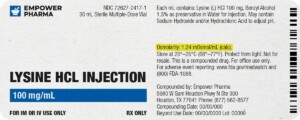
Given the vastness and uniqueness of individualized compounded formulations, it is impossible to list every potential compound we offer. To inquire if we currently carry or can compound your prescription, please fill out the form located on our Contact page or call us at (877) 562-8577.
We source all our medications and active pharmaceutical ingredients from FDA-registered suppliers and manufacturers.

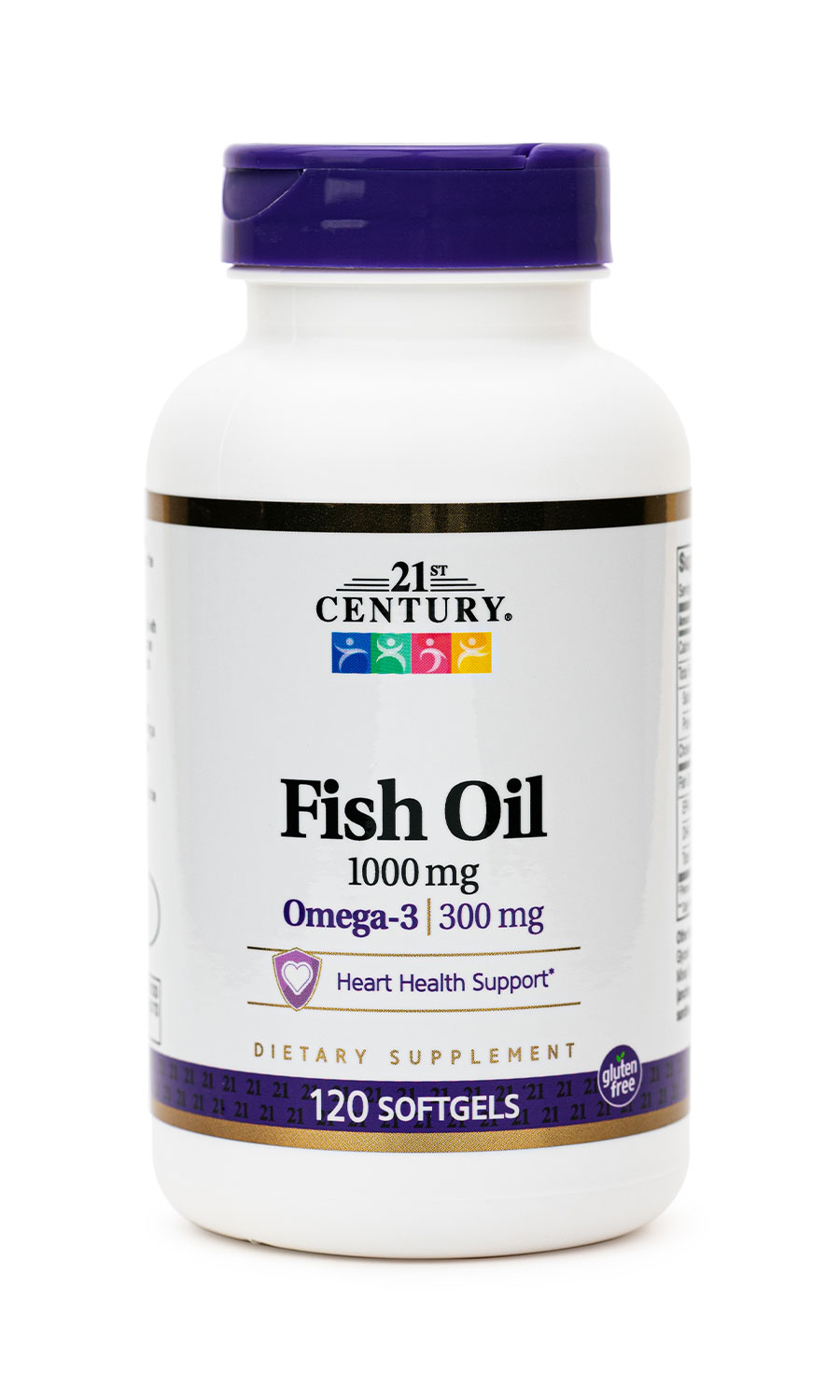
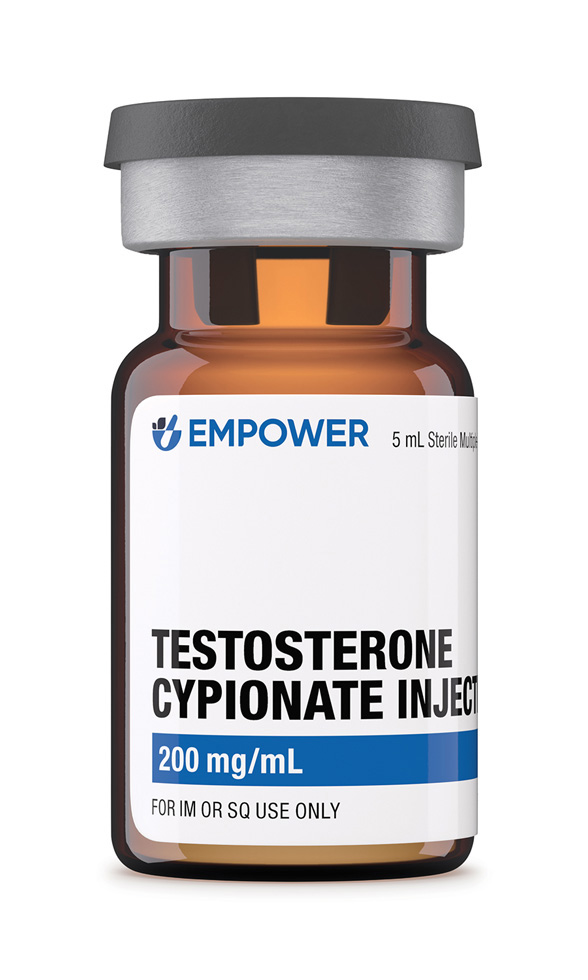 Testosterone Cypionate Injection
Testosterone Cypionate Injection Anastrozole Capsules
Anastrozole Capsules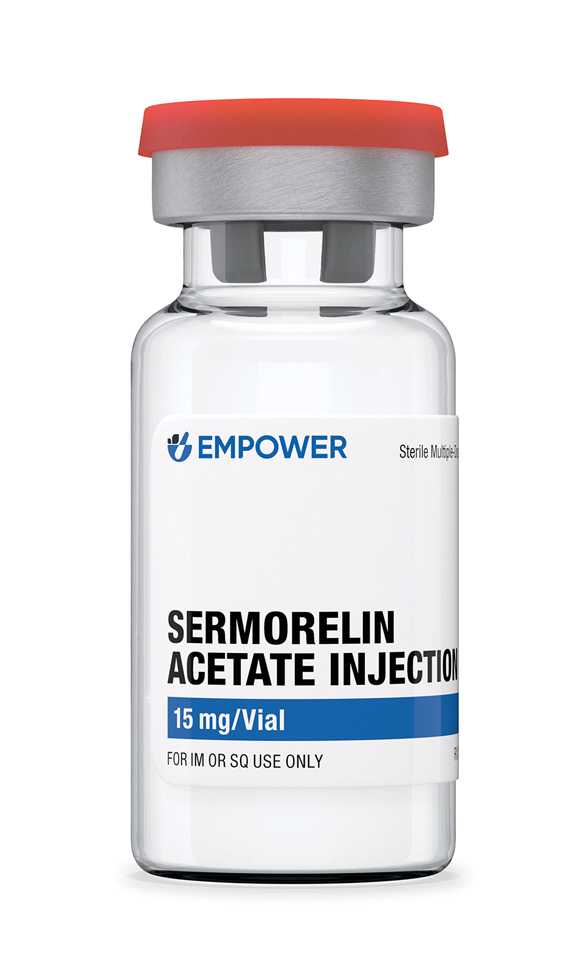 Sermorelin Acetate Injection
Sermorelin Acetate Injection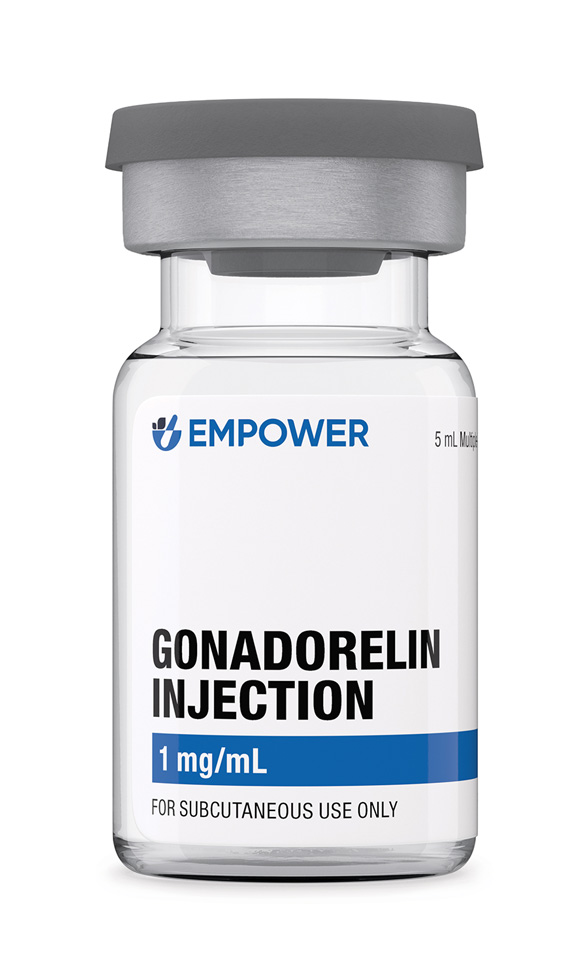 Gonadorelin Injection
Gonadorelin Injection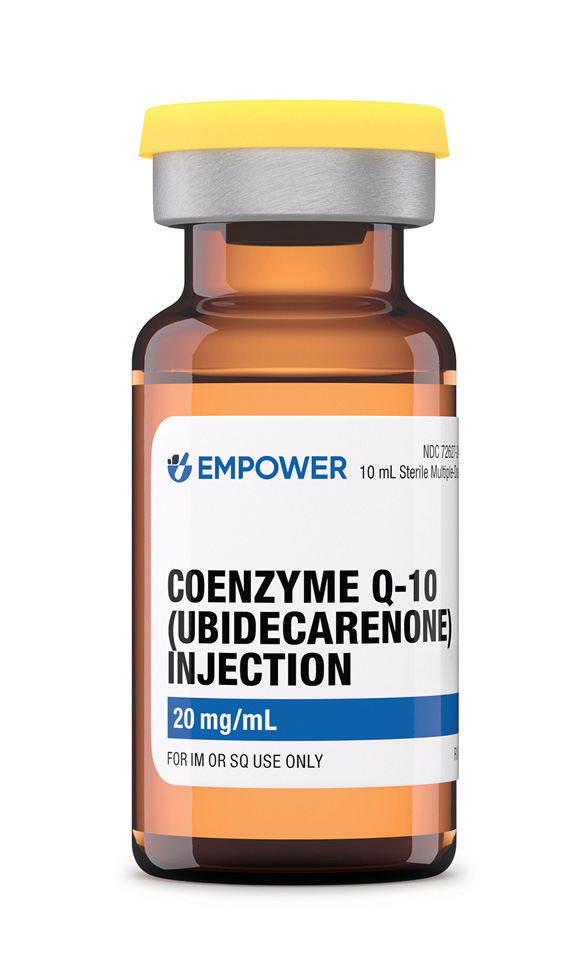 Coenzyme Q10 (Ubidecarenone) Injection
Coenzyme Q10 (Ubidecarenone) Injection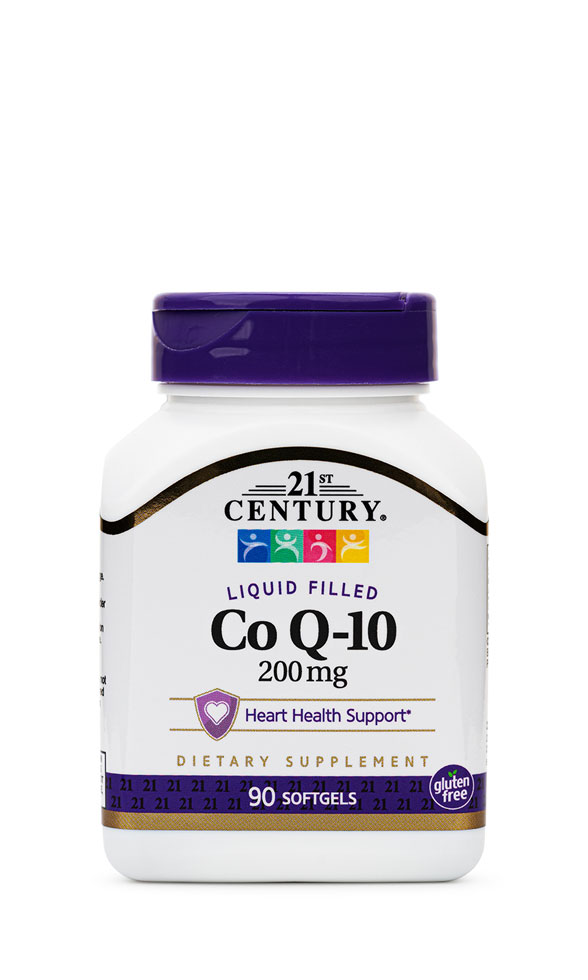 Coenzyme Q10 Capsules
Coenzyme Q10 Capsules